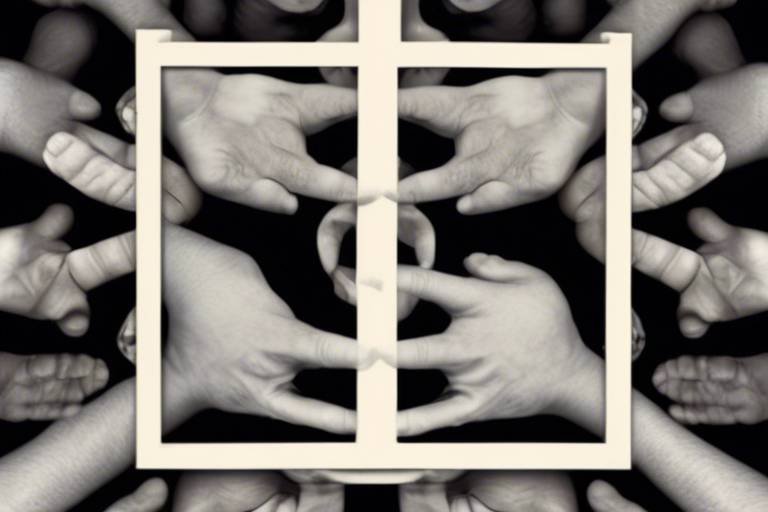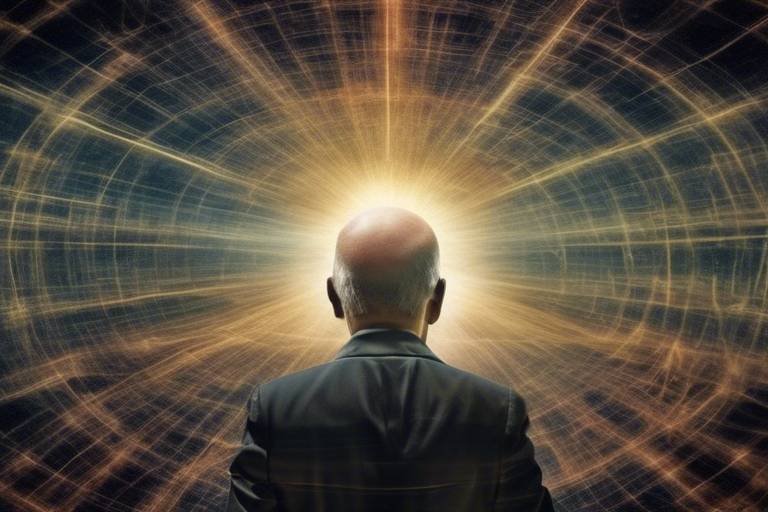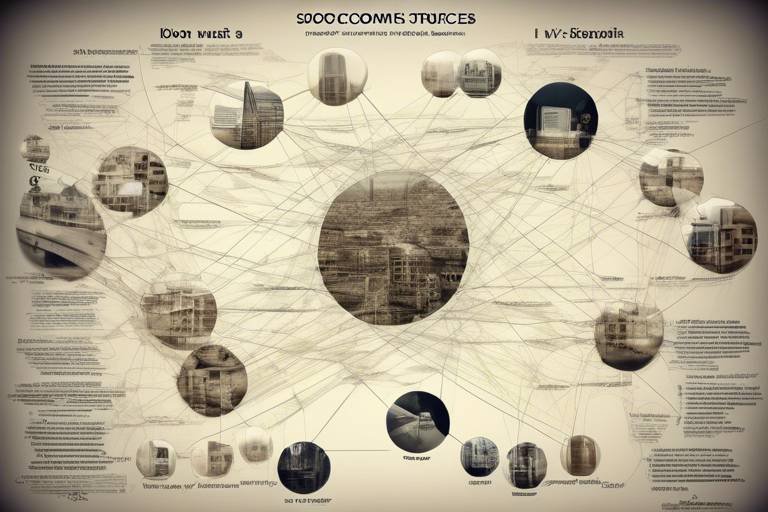Analyzing Personal Identity Through Ontology
In the vast expanse of philosophical inquiry, few topics captivate the mind quite like the exploration of personal identity. What does it mean to be "you"? Is it simply a matter of memory, or is there something deeper at play? This article ventures into the intricate relationship between ontology—the study of being—and personal identity, revealing how these concepts intertwine and influence our understanding of selfhood in a world that often feels chaotic and complex.
To begin with, let's unravel the very essence of personal identity. This concept isn't just a philosophical puzzle; it’s a fundamental aspect of our daily lives. When we think of ourselves, we tend to consider our memories, experiences, and even our relationships. But what if I told you that these elements are just the tip of the iceberg? Philosophers have debated for centuries about what truly constitutes our identity. Is it our physical body, our thoughts, or perhaps our social connections? Each perspective offers unique insights, yet none can fully encapsulate the richness of our existence.
At its core, personal identity is about continuity. It’s the thread that connects our past, present, and future selves. Imagine you are weaving a tapestry; each memory, experience, and relationship is a thread that contributes to the overall design. However, if one thread is pulled out, the entire tapestry may become frayed, leading to questions about who we are. This is where ontology steps in, providing a philosophical foundation that helps us understand not just what it means to exist, but how our existence shapes our identity.
When we dive deeper into the nature of personal identity, we encounter a myriad of philosophical definitions and frameworks. Some argue that identity is rooted in psychological continuity, while others insist it's tied to our physical bodies. This debate is not merely academic; it has profound implications for how we view ourselves and our relationships with others.
In a world where technology blurs the lines of identity—think social media profiles and digital avatars—understanding the essence of personal identity becomes even more critical. Are we the sum of our online personas, or do we retain an intrinsic self that transcends these digital representations? As we explore these questions, it’s essential to consider how our understanding of ontology informs our views on identity.
Ontology serves as the bedrock of our exploration into personal identity. It’s not just about existence; it’s about understanding the categories and relationships that define our being. Ontology asks the big questions: What is real? What does it mean to exist? These inquiries lay the groundwork for how we perceive our identities in various contexts.
Throughout history, several key figures have shaped our understanding of ontology and, by extension, personal identity. From Plato’s Theory of Forms to Descartes’ cogito, these philosophical movements have provided frameworks that continue to influence contemporary thought.
Plato’s Theory of Forms posits that beyond our physical world lies a realm of ideal forms that represent the true essence of things. This perspective invites us to ponder: if our identity is merely a shadow of these ideal forms, what does that say about our existence? Are we destined to chase an unattainable ideal, or can we find meaning in our imperfect selves?
René Descartes famously declared, "I think, therefore I am." This assertion emphasizes the significance of self-awareness in defining personal identity. According to Descartes, our ability to doubt, think, and reflect is what makes us truly human. But what happens when our thoughts are clouded by external influences or internal struggles? This raises critical questions about the stability of our identity and how it can shift over time.
Modern ontological theories, such as existentialism and phenomenology, further enrich our understanding of personal identity. Existentialists argue that identity is not a fixed entity but rather a fluid construct shaped by our choices and experiences. Phenomenology, on the other hand, emphasizes the lived experience, suggesting that our perceptions and interactions with the world are integral to our sense of self.
Memory plays a pivotal role in shaping personal identity. Our recollections create a narrative that we use to make sense of who we are. Imagine reading a book where the chapters are out of order; it would be challenging to grasp the story's essence. Similarly, our memories provide the structure for our identity, allowing us to connect our past experiences with our present self.
Various theories of memory, both psychological and philosophical, offer insights into how we maintain continuity in our identity. From the idea of episodic memory, which allows us to recall specific events, to the concept of autobiographical memory, which weaves together our life story, these frameworks help us understand the intricate relationship between memory and identity.
However, what happens when memory falters? Memory loss can lead to profound identity crises, prompting existential questions about who we are without our recollections. This struggle can be likened to a ship navigating through fog; without a clear sense of direction, one may feel lost at sea. Understanding the implications of memory loss on personal identity is crucial, as it highlights the delicate fabric that holds our sense of self together.
Finally, the exploration of personal identity has significant ethical implications. Our understanding of identity influences how we interact with others and the responsibilities we bear within society. Recognizing the fluidity of identity can foster empathy and compassion, encouraging us to appreciate the diverse experiences that shape each individual.
As we conclude this journey through the intricate relationship between ontology and personal identity, it's clear that our understanding of selfhood is both complex and deeply personal. The philosophical inquiries into existence, memory, and identity not only enrich our intellectual pursuits but also guide our interactions in a diverse world.
- What is personal identity? Personal identity refers to the qualities, beliefs, personality, looks, and expressions that make a person or group. It is how we perceive ourselves and how we are recognized by others.
- How does memory affect personal identity? Memory is crucial for personal identity as it helps create a cohesive narrative of our lives, linking our past experiences to our current self.
- What is ontology? Ontology is a branch of philosophy that studies the nature of being, existence, and reality, including the categories and relationships that define entities.
- How do philosophical theories influence our understanding of identity? Philosophical theories provide frameworks that help us explore the complexities of identity, including aspects like continuity, self-awareness, and the impact of memory.

The Nature of Personal Identity
When we dive into the realm of personal identity, we encounter a fascinating tapestry woven from various threads of philosophy, psychology, and even sociology. At its core, personal identity is about understanding what makes you, *you*. It's not just about your name or your social security number; it’s about the essence of your being, the continuity of your experiences, and how these elements shape your perception of self over time. Imagine trying to piece together a jigsaw puzzle without knowing what the final picture looks like. That’s how complex and intricate the concept of personal identity is.
Philosophers have long grappled with the question of identity, pondering what it means to remain the same person throughout the years despite the inevitable changes we undergo. Think about it: your body is constantly changing—cells die and regenerate, your thoughts evolve, and your experiences shape your worldview. Yet, there’s a part of you that feels constant. This paradox raises several questions:
- What is the essence of personal identity?
- Is it tied to our physical form, our memories, or perhaps our consciousness?
- Do we remain the same person as we grow older, or do we transform into entirely different beings?
To tackle these questions, we can look at various philosophical frameworks. One prominent view is the psychological continuity theory, which suggests that personal identity is largely defined by the continuity of psychological states—our memories, thoughts, and consciousness. This theory posits that as long as there is a connection between our past and present selves through memories, we can consider ourselves the same person.
On the other hand, there are those who argue for a more physicalist approach, asserting that our identity is intrinsically linked to our biological continuity. This perspective highlights the physical body as the anchor of our identity, suggesting that as long as our body remains, so does our identity. But what happens if we undergo significant changes, such as a severe injury or illness? Does that alter our identity? These philosophical debates illustrate the complexity of defining personal identity.
Moreover, cultural and societal factors play a crucial role in shaping our identity. Our interactions with family, friends, and society at large contribute to our self-concept. For instance, consider how your cultural background influences your values, beliefs, and even your aspirations. These elements are integral to understanding who you are in a broader context. In this sense, personal identity is not just a solitary endeavor; it’s a collective experience shaped by the world around us.
In summary, the nature of personal identity is a multifaceted concept that invites us to explore the intersections of philosophy, psychology, and culture. It challenges us to reflect on our own lives and consider how our memories, experiences, and relationships contribute to our sense of self. As we continue this exploration, we’ll delve deeper into the philosophical foundations of ontology and how they relate to our understanding of identity.
- What is personal identity? Personal identity refers to the qualities, beliefs, personality, looks, and expressions that make a person or group. It encompasses the essence of what makes you uniquely you.
- How does memory influence personal identity? Memory plays a crucial role in personal identity by linking our past experiences to our present self, helping us maintain a coherent sense of who we are over time.
- Can a person change their identity? Yes, personal identity can evolve due to various factors such as experiences, relationships, and societal influences. However, the core essence often remains intact.

Ontology: A Philosophical Foundation
Ontology, at its core, is the branch of philosophy that investigates the nature of being, existence, and reality. It seeks to answer profound questions about what it means to exist and what categories of things populate our universe. Think of ontology as the blueprint of reality, a framework that helps us understand not just the physical world around us, but also the abstract concepts that define our lives. In exploring ontology, we delve into the fundamental structures that underpin our understanding of personal identity.
To grasp the significance of ontology in relation to personal identity, we must first recognize that our existence is not merely a matter of being alive; it encompasses a rich tapestry of experiences, memories, and relationships. Ontology provides the tools to dissect these layers of existence, allowing us to categorize and understand the myriad elements that contribute to who we are. For instance, consider the following key questions that ontology helps us address:
- What constitutes existence? Is it merely physical presence, or does it also include thoughts, emotions, and experiences?
- How do we categorize different types of beings? Are humans fundamentally different from animals, or do we share a common essence?
- What is the relationship between identity and time? How do changes over time affect our sense of self?
These questions are not just academic; they have real implications for how we perceive ourselves and others. By understanding the ontological categories that define our existence, we can better navigate the complexities of personal identity. For instance, the distinction between substance and attribute in ontology can illuminate how we view ourselves. Are we defined by our physical bodies, or do our thoughts and feelings hold greater significance?
Moreover, ontology intersects with various other philosophical disciplines, such as epistemology and ethics, creating a rich dialogue that enhances our understanding of selfhood. When we consider how we come to know things (epistemology), we realize that our understanding of existence is deeply intertwined with our identity. The way we perceive and interpret our experiences shapes who we are, and ontology helps map out this intricate relationship.
Throughout history, various philosophers have contributed to the development of ontological thought, shaping our contemporary understanding of identity and existence. From ancient thinkers like Plato to modern existentialists, each has offered unique insights that continue to resonate today.
Plato's Theory of Forms posits that beyond our physical realm lies a world of ideal forms, which represent the true essence of things. According to Plato, our identities are not solely tied to our physical bodies but are reflections of these ideal forms. This notion invites us to ponder: if our essence is separate from our physical existence, what does that mean for our personal identity? Are we merely shadows of our true selves, or do we embody these ideal forms in our daily lives?
René Descartes famously declared, "I think, therefore I am," emphasizing the role of self-awareness in defining existence. His ontological perspective suggests that our ability to doubt and think is central to our identity. This raises intriguing questions about the nature of consciousness and its implications for personal identity. If our thoughts are the foundation of our being, how do we reconcile changes in thought over time with a consistent sense of self?
As we continue to explore ontology, we uncover a vast landscape of philosophical inquiry that enriches our understanding of personal identity. From the ancient Greeks to contemporary thinkers, the dialogue surrounding existence and identity remains vibrant and essential in our quest to understand what it means to be human.

Historical Perspectives on Ontology
Ontology, as a branch of philosophy, has evolved through centuries, shaped by the thoughts and theories of numerous influential figures. To grasp the current understanding of personal identity, it's essential to explore these historical perspectives. The journey begins with the ancient Greeks, where philosophers like Plato and Aristotle laid the groundwork for ontological inquiry. Plato's Theory of Forms posited that non-material abstract forms, or ideas, are the most accurate reality, influencing how we perceive identity as something beyond mere physical existence.
Moving forward in time, we encounter René Descartes, whose famous declaration, "I think, therefore I am," revolutionized the concept of self-awareness and personal identity. Descartes emphasized the importance of thought and consciousness in defining existence, suggesting that our ability to doubt and think critically is what fundamentally makes us who we are. This Cartesian perspective introduced a dualistic view of identity, separating the mind from the body and prompting further philosophical debates about the nature of self.
As we delve deeper into the history of ontology, we come across Immanuel Kant, who challenged previous notions by proposing that our understanding of reality is shaped by our experiences and perceptions. Kant's ideas on the "transcendental ego" suggested that personal identity is not merely about existing in the world but also about how we interpret and understand that existence through our unique experiences.
In the 20th century, ontological discussions took a new turn with the emergence of existentialism and phenomenology. Thinkers like Martin Heidegger and Jean-Paul Sartre emphasized the importance of individual experience and existence. Heidegger's concept of "being" focused on the lived experience and the existential conditions that shape personal identity, while Sartre famously asserted that "existence precedes essence," suggesting that individuals create their identities through their choices and actions.
In summary, the historical perspectives on ontology reveal a rich tapestry of thought that has significantly influenced our understanding of personal identity. From Plato's ideal forms to Descartes' emphasis on thought, and Kant's focus on perception, each philosopher has contributed to the ongoing dialogue about what it means to be an individual in a complex world. This exploration not only enriches our philosophical understanding but also provides a framework for examining contemporary issues related to identity and existence.
- What is ontology? Ontology is a branch of philosophy that studies the nature of being, existence, and the categories of being.
- How does ontology relate to personal identity? Ontology provides a foundational framework for understanding personal identity by examining what it means to exist and how we categorize our experiences and selves.
- Who are some key figures in the history of ontology? Important figures include Plato, Aristotle, René Descartes, Immanuel Kant, Martin Heidegger, and Jean-Paul Sartre.
- What is the significance of memory in personal identity? Memory plays a crucial role in shaping our sense of self, as it allows us to connect past experiences with our present identity.

Plato and the Theory of Forms
When we dive into the depths of Plato's philosophy, we find ourselves grappling with the profound Theory of Forms. This theory posits that beyond our tangible world lies a realm of ideal forms, where the essence of all things resides. Imagine a world where every object, idea, or concept has a perfect version, untouched by the imperfections of the physical realm. For Plato, these forms are the true reality, while the objects we encounter daily are merely shadows or reflections of these perfect ideals.
Consider this analogy: think of a chair. In our world, chairs come in various shapes, sizes, and materials. However, according to Plato, there exists a perfect 'Chair-ness'—an ideal form of a chair that embodies all the characteristics that make a chair what it is. This idea extends to every conceivable object and concept, including personal identity itself. Plato believed that understanding these forms was crucial for grasping the essence of what it means to be human.
In terms of personal identity, Plato's Theory of Forms suggests that our identities are not just a collection of experiences and memories but rather reflections of an ideal form of ourselves. This raises intriguing questions: Are we ever truly ourselves, or are we constantly striving to align with our ideal form? The implications of this theory stretch beyond mere philosophy; they touch on the very core of our existence and how we perceive ourselves in relation to the world around us.
Moreover, Plato's ideas have sparked extensive debates in philosophical circles. Many have critiqued the Theory of Forms, arguing that it creates a dichotomy between the ideal and the real, which can lead to confusion about what constitutes true identity. To illustrate this, let's look at the following table that summarizes key aspects of Plato's Theory of Forms:
| Aspect | Description |
|---|---|
| Ideal Forms | Perfect, unchanging concepts that represent the essence of all things. |
| Physical Objects | Imperfect representations or shadows of the ideal forms. |
| Personal Identity | Identity as a reflection of an ideal self, beyond mere experiences. |
Ultimately, Plato's Theory of Forms offers a fascinating lens through which we can examine personal identity. It challenges us to think about who we are beyond our physical existence and the memories that shape us. Are we merely a collection of experiences, or is there an ideal version of ourselves that we are striving to realize? This philosophical inquiry not only enriches our understanding of identity but also invites us to explore the deeper meanings of existence itself.
- What is the Theory of Forms?
The Theory of Forms is a philosophical concept proposed by Plato, suggesting that non-material abstract forms represent the most accurate reality. - How does Plato's Theory relate to personal identity?
Plato's Theory posits that our identities are reflections of ideal forms, suggesting that our true selves exist beyond our physical experiences. - What are some critiques of the Theory of Forms?
Critics argue that the Theory creates a false dichotomy between the ideal and the real, complicating our understanding of identity.

Descartes and the Cogito
René Descartes, a towering figure in the realm of philosophy, made a profound contribution to our understanding of personal identity through his famous declaration, "Cogito, ergo sum" (I think, therefore I am). This assertion is not merely a philosophical statement; it serves as a foundational element in the exploration of self-awareness and existence. Descartes posited that the very act of thinking is proof of one's existence. In a world filled with uncertainty, where the external can often deceive, the internal realm of thought remains an undeniable certainty.
But what does this mean for personal identity? Essentially, Descartes argues that our thoughts, doubts, and reflections are the essence of who we are. To illustrate this, consider the following:
- When you ponder your existence, you affirm it.
- Through introspection, you engage with your own thoughts, which solidifies your identity.
- Your capacity to question and reflect on your experiences is what makes you uniquely you.
This leads us to an intriguing question: if our identity is anchored in our thoughts, what happens when those thoughts are altered or lost? Descartes' perspective emphasizes the importance of cognitive continuity. If we can maintain a thread of thought over time, we can argue for the persistence of identity. However, this raises complex issues about memory and its role in shaping who we are.
Moreover, Descartes' dualistic approach—separating the mind from the body—adds another layer to the discussion of identity. He believed that while the body is subject to change and decay, the mind, as a thinking substance, remains constant. This distinction invites us to ponder: is our identity solely tied to our mental processes, or is it also influenced by our physical experiences? The interplay between mind and body becomes essential in understanding the full spectrum of personal identity.
To further explore Descartes' impact, let’s summarize some key implications of his philosophy:
| Aspect | Implication |
|---|---|
| Thought | Proof of existence and identity |
| Cognitive Continuity | Maintains personal identity over time |
| Mind-Body Dualism | Separation of mental and physical identity |
In conclusion, Descartes' cogito not only provides a framework for understanding existence but also challenges us to reflect on the nature of our identity. By emphasizing the primacy of thought, he lays the groundwork for future philosophical inquiries into what it means to be human. As we navigate through the complexities of life, his insights remind us that our ability to think and reflect is central to our understanding of selfhood.

I think, therefore I am,
This article explores the intricate relationship between ontology and personal identity, delving into philosophical perspectives, theories, and implications for understanding selfhood in a complex world.
This section examines what constitutes personal identity, exploring various philosophical definitions and frameworks that help us understand the essence of being and continuity over time.
Here, we delve into ontology as a branch of philosophy, discussing its significance in understanding existence, reality, and the categories that define personal identity in diverse contexts.
This subheading reviews key historical figures and movements in ontology, highlighting how their ideas have shaped contemporary understanding of identity and existence.
Exploring Plato's Theory of Forms, we analyze how his ideas about ideal forms contribute to our understanding of identity and the essence of individuals beyond mere physical existence.
René Descartes, a pivotal figure in the realm of philosophy, famously declared, "I think, therefore I am." This assertion serves as a cornerstone for discussions about personal identity and self-awareness. At its core, this phrase encapsulates the profound connection between thought and existence. Descartes posited that the very act of thinking is evidence of one’s existence. In a world filled with uncertainty, this declaration offers a solid foundation upon which to build our understanding of self.
Consider this: when you question your existence, when you ponder your thoughts, you are engaging in a reflective process that confirms your being. It’s as if Descartes handed us a mirror—when we look into it, we see not just our physical form but the essence of our consciousness. This notion challenges us to think deeply about what it means to be a person. Is our identity merely a collection of memories, experiences, and traits? Or is it something more profound, embedded in our ability to reflect and reason?
Descartes’ cogito also opens the door to discussions about the nature of consciousness. If our thoughts are the bedrock of our identity, then what happens when those thoughts are altered or disrupted? This leads us to consider the implications of mental health, cognitive decline, and the very fabric of personal identity itself.
In modern philosophy, Descartes' ideas have sparked debates about the relationship between mind and body, leading to various interpretations and critiques. Some argue that the mind cannot exist independently of the body, while others hold that consciousness is a separate entity altogether. This ongoing dialogue underscores the complexity of personal identity.
We explore modern ontological theories, such as existentialism and phenomenology, and their contributions to understanding personal identity in relation to existence and experience.
This section investigates the significance of memory in shaping personal identity, analyzing how recollections contribute to a cohesive sense of self over time.
Here, we discuss various theories of memory, including psychological and philosophical perspectives, and their implications for understanding continuity in personal identity.
This subheading examines the effects of memory loss on personal identity, exploring how disruptions in memory can lead to existential questions and crises of selfhood.
In this final section, we consider the ethical implications of personal identity theories, discussing how our understanding of identity affects social interactions, responsibilities, and moral considerations in society.
- What is the significance of "I think, therefore I am"?
This phrase highlights the connection between thought and existence, suggesting that the act of thinking is proof of one's existence. - How does memory affect personal identity?
Memory plays a crucial role in shaping our sense of self, as it helps us maintain continuity over time. - What are the implications of memory loss on identity?
Memory loss can lead to identity crises, as individuals may struggle to connect with their past selves. - How do contemporary theories of ontology relate to personal identity?
Modern theories like existentialism explore the relationship between existence, experience, and identity, providing insights into the nature of selfhood.

examining its implications for personal identity and the nature of self-awareness in the context of ontology.
What makes you, well, you? This question has puzzled philosophers for centuries, and it lies at the heart of personal identity. Personal identity encompasses the characteristics and experiences that define an individual over time, allowing for a sense of continuity despite the inevitable changes we face. Various philosophical definitions and frameworks have emerged, each offering unique insights into what constitutes our essence. From psychological continuity to biological factors, understanding personal identity is crucial in navigating our complex world.
Ontology, the study of being and existence, serves as a philosophical backbone for understanding personal identity. It dives deep into the nature of reality and the categories that shape our identities in different contexts. By examining ontology, we can uncover the layers of existence that contribute to who we are, leading us to profound questions about our place in the universe.
Throughout history, key figures have shaped the landscape of ontology, influencing our understanding of identity. From ancient philosophers to modern thinkers, their ideas have paved the way for contemporary discussions on existence and selfhood. Their contributions highlight the evolution of thought regarding what it means to be an individual.
Plato's Theory of Forms posits that beyond our physical world lies a realm of ideal forms, representing the true essence of things. This concept invites us to consider that our identities may not be solely based on our physical presence but rather on an idealized version of ourselves that transcends the material. By exploring this theory, we can better understand how our identities are shaped by both tangible experiences and abstract ideals.
Examining Descartes' famous assertion, "I think, therefore I am," we delve into its implications for personal identity and self-awareness. This statement emphasizes the role of thought in establishing one's existence. Descartes suggests that the very act of thinking is proof of one's identity, leading us to ponder: if our thoughts define us, what happens when those thoughts change? This exploration reveals the intricate relationship between consciousness and identity, challenging us to consider how self-awareness shapes our understanding of who we are.
Modern ontological theories, such as existentialism and phenomenology, further enrich our understanding of personal identity. Existentialists argue that individuals are responsible for creating their own identities through choices and experiences, while phenomenologists focus on how our perceptions shape our sense of self. Together, these theories illustrate the dynamic nature of identity in relation to existence and experience, prompting us to reflect on our own journeys of self-discovery.
Memory plays a pivotal role in shaping our personal identities. It is through memories that we construct a cohesive narrative of our lives, allowing us to connect our past experiences with our present selves. Memories serve as the threads that weave together the fabric of our identities, influencing our beliefs, values, and actions. But what happens when those memories fade or are lost? This question leads us to explore the profound impact of memory on our sense of self.
Various theories of memory, from psychological to philosophical perspectives, shed light on the intricate relationship between memory and identity. For instance, psychological theories emphasize the role of episodic memory—our recollections of specific events—while philosophical theories explore how memory contributes to the continuity of the self. Understanding these theories helps us grasp how our memories shape our identities over time.
Memory loss can trigger an identity crisis, leaving individuals grappling with existential questions about who they are without their memories. When memories are disrupted, the continuity of personal identity is challenged, leading to feelings of confusion and disconnection. This phenomenon underscores the vital role memory plays in maintaining a coherent sense of self, prompting us to consider how we define ourselves in the absence of our past experiences.
Theories of personal identity have significant ethical implications, influencing how we interact with others and our responsibilities within society. Our understanding of identity shapes our moral considerations, guiding us in our relationships and social interactions. As we navigate the complexities of identity, it becomes essential to reflect on how our beliefs about selfhood impact our ethical frameworks.
- What is personal identity? Personal identity refers to the characteristics and experiences that define an individual over time, allowing for continuity despite changes.
- How does memory affect personal identity? Memory shapes our personal identities by providing a cohesive narrative of our lives, influencing our beliefs, values, and actions.
- What role does ontology play in understanding identity? Ontology, the study of being and existence, serves as a philosophical foundation for exploring the nature of personal identity and the categories that define it.
- Can memory loss lead to an identity crisis? Yes, memory loss can disrupt the continuity of personal identity, leading individuals to question who they are without their past experiences.

Contemporary Ontological Theories
In the ever-evolving landscape of philosophy, contemporary ontological theories stand as pivotal frameworks that help us navigate the complexities of personal identity. These theories have emerged as responses to traditional notions of existence, offering fresh perspectives that resonate with our lived experiences. Two of the most significant movements in contemporary ontology are existentialism and phenomenology. Both of these schools of thought delve into the nature of being and the subjective experience of existence, fundamentally reshaping how we understand personal identity.
Existentialism, popularized by thinkers such as Jean-Paul Sartre and Simone de Beauvoir, emphasizes the individual's experience and the freedom to create one's essence through choices. This philosophy posits that existence precedes essence, meaning that we are not born with a predetermined identity but rather forge it through our actions and decisions. In this light, personal identity becomes a dynamic process, constantly reshaped by our experiences and choices. Sartre famously stated, "Man is condemned to be free," highlighting the weight of responsibility that comes with this freedom. This perspective encourages individuals to take ownership of their identity and the paths they choose in life, making it a powerful lens through which to examine selfhood.
On the other hand, phenomenology, founded by Edmund Husserl and further developed by Martin Heidegger, focuses on the structures of experience and consciousness. This approach seeks to understand how we perceive and interpret the world around us, emphasizing the importance of lived experiences in shaping our identity. Phenomenologists argue that personal identity is not just a static concept but is deeply intertwined with our interactions and engagements with the world. For instance, Heidegger's notion of "being-in-the-world" suggests that our identity is shaped by our relationships and the contexts in which we find ourselves. This perspective invites us to consider how our identities are influenced by cultural, social, and historical factors, making it a rich area for exploration.
Moreover, contemporary ontological theories also engage with questions of technology and virtual existence. In an age where digital identities can often overshadow physical ones, philosophers are grappling with how these new forms of existence impact our understanding of selfhood. The rise of social media, for instance, has blurred the lines between our online personas and our real-world identities, leading to intriguing discussions about authenticity and representation. As we navigate these digital landscapes, we must consider how they contribute to or complicate our sense of self.
In summary, contemporary ontological theories provide invaluable insights into the multifaceted nature of personal identity. By examining existentialism and phenomenology, we gain a deeper understanding of how our experiences, choices, and even technological advancements shape who we are. As we continue to explore these theories, we uncover the rich tapestry of identity that defines our existence in a complex and ever-changing world.
- What is the main focus of existentialism in relation to personal identity? Existentialism emphasizes individual freedom and the idea that people create their own identity through choices and actions.
- How does phenomenology differ from existentialism? While existentialism focuses on personal freedom and choice, phenomenology examines the structures of experience and how they shape our perceptions of identity.
- What role does technology play in contemporary discussions of identity? Technology complicates traditional notions of identity by creating digital personas that may differ from our physical selves, raising questions about authenticity.

The Role of Memory in Identity
Memory plays a pivotal role in shaping our personal identity, acting as the thread that weaves together the fabric of our experiences, emotions, and self-perception. Imagine your life as a vast tapestry, where each memory is a unique thread contributing to the overall picture of who you are. Without these threads, the tapestry would be incomplete, and our sense of self would be fragmented. But what exactly is the relationship between memory and identity? How do our recollections influence our understanding of who we are over time?
To grasp the significance of memory in personal identity, we must first understand how memories are formed and stored. Our memories are not just passive recordings of events; they are dynamic constructs that can change over time. This malleability means that our recollections can be influenced by various factors, such as emotions, social interactions, and even the passage of time. Thus, the memories we hold dear are not merely snapshots of our past; they are active components that shape our ongoing narrative.
One of the most fascinating aspects of memory is its ability to create a cohesive sense of self. When we think back on our lives, we often recount stories that define us—our achievements, challenges, and relationships. These narratives help us to construct a coherent identity, allowing us to bridge the gap between our past, present, and future. For instance, consider how someone might view themselves as a “survivor” after overcoming a significant life challenge. This identity is deeply rooted in their memories of that experience and the lessons learned along the way.
However, the relationship between memory and identity is not without its complexities. Memory is subject to distortions, omissions, and even fabrications. This raises important questions: If our memories can be unreliable, how can we trust them to define our identity? What happens when memories fade or are lost altogether? These questions lead us to explore various theories of memory and their implications for personal identity.
Several theories of memory provide insight into its role in shaping identity. For example, the psychological perspective emphasizes the importance of episodic memory—our ability to recall specific events and experiences. This type of memory is crucial for constructing our life narrative and maintaining continuity in our sense of self. On the other hand, philosophical perspectives often focus on the concept of psychological continuity, arguing that our identity is tied to the continuity of our memories over time.
As we delve deeper into the implications of memory for personal identity, we must also consider the phenomenon of memory loss. Whether due to aging, trauma, or neurological conditions, memory loss can lead to profound identity crises. Imagine waking up one day and struggling to recognize yourself in the mirror, not just in a physical sense but also in terms of who you are as a person. This experience can be disorienting and terrifying, prompting existential questions about the essence of selfhood.
When individuals experience memory loss, they may find themselves grappling with feelings of confusion and disconnection. The memories that once anchored their identity can become elusive, leading to a sense of being unmoored in their own lives. This disruption can trigger a cascade of questions: “Who am I without my memories?” “What remains of my identity when my recollections fade?” Such crises highlight the integral role that memory plays in our understanding of self, underscoring the delicate relationship between memory and personal identity.
In conclusion, memory is not just a repository of past experiences; it is a fundamental component of our identity. It shapes how we view ourselves, influences our relationships, and even informs our moral responsibilities. As we navigate the complexities of identity in a rapidly changing world, understanding the role of memory becomes increasingly essential. After all, our memories are the stories we tell ourselves, and those stories are what make us who we are.
- How does memory affect personal identity? Memory helps create a cohesive narrative of our lives, influencing our self-perception and continuity over time.
- What happens to identity when memories are lost? Memory loss can lead to identity crises, causing individuals to question who they are without their recollections.
- Are all memories reliable? No, memories can be distorted or influenced by emotions, making them potentially unreliable in defining identity.
- Can memory be improved? Yes, various techniques and practices can enhance memory, which in turn can help reinforce personal identity.

Memory Theories and Identity
Memory plays a pivotal role in shaping our personal identity, acting as the thread that weaves together our past experiences, current self, and future aspirations. Theories of memory vary widely, reflecting different philosophical and psychological perspectives. Some scholars argue that memory is not just a repository of past events but a dynamic process that continuously influences our self-concept. For instance, the psychological perspective posits that our memories form the basis of our identity, allowing us to maintain a sense of continuity over time. This continuity is crucial; without our memories, who would we truly be?
One prominent theory is the episodic memory theory, which suggests that specific memories of personal experiences contribute significantly to our identity. Think of it like a scrapbook filled with snapshots of your life. Each memory serves as a unique page, helping you to construct a narrative that defines who you are. This narrative is not static; it evolves as we gather new experiences and reflect on past ones. For example, a person might recall a childhood event that shapes their values or beliefs, reinforcing the idea that our memories are integral to our sense of self.
On the other hand, the semantic memory theory emphasizes the role of general knowledge and facts in shaping identity. This theory posits that our understanding of the world, including our cultural and social contexts, contributes to our identity. For instance, knowing the history of your culture or the values of your community can influence how you perceive yourself and your place in society. In this way, memory acts as a bridge between individual experiences and collective identity.
Moreover, the interplay between memory and identity can be seen in various contexts, such as trauma or significant life events. When individuals experience trauma, their memories may become fragmented or distorted, leading to a crisis of identity. This phenomenon highlights the delicate balance between memory and selfhood. As we explore these theories, it's essential to recognize that memory is not merely a passive storehouse of information but an active, reconstructive process that plays a crucial role in how we define ourselves.
In summary, the theories surrounding memory and identity reveal a complex relationship that underscores the importance of our recollections in forming a cohesive self. Whether through episodic memories that narrate our personal stories or semantic memories that provide a broader context, our identities are intricately linked to the memories we hold. This relationship prompts us to ask: if our memories were to fade, would our identities follow suit? This question leads us to consider the implications of memory loss, which we will explore further in the next section.
- What is the relationship between memory and personal identity?
Memory is crucial for maintaining a sense of self, as it allows individuals to connect their past experiences with their present and future. - How do different memory theories contribute to our understanding of identity?
Various memory theories, such as episodic and semantic memory, highlight the importance of personal experiences and general knowledge in shaping our identities. - Can memory loss affect personal identity?
Yes, memory loss can lead to a crisis of identity, as individuals may struggle to connect with their past and understand who they are without their memories.

Memory Loss and Identity Crisis
Memory loss can be a devastating experience, not just for the individual affected but also for their loved ones. It raises profound questions about personal identity and selfhood. When we think about who we are, we often rely on our memories to provide continuity and coherence to our lives. Imagine a book where entire chapters are missing; the story becomes fragmented, and the character's journey is left incomplete. This is similar to what happens when someone experiences memory loss.
Consider the implications of forgetting significant events, relationships, and experiences. How does one maintain a sense of self when the very foundation of that self is eroding? Memory is not merely a collection of past experiences; it is the thread that weaves together the fabric of our identity. When memories fade, individuals may find themselves in an identity crisis, questioning their roles, values, and connections to others. This crisis can lead to feelings of confusion, anxiety, and even despair, as the person grapples with the essence of who they are without their memories.
Research has shown that memory loss can trigger existential questions that challenge our understanding of identity. For instance, individuals suffering from conditions like Alzheimer's disease often lose their ability to recall personal information, such as names of family members or significant life events. This loss can create a dissonance between how they perceive themselves and how others perceive them. The individual may still feel like the same person internally, yet their external reality tells a different story.
Moreover, the emotional impact of memory loss can be profound. It can lead to feelings of isolation and loneliness, as individuals may struggle to connect with others who remember them as they once were. The disconnect between past and present can create a chasm that feels impossible to bridge. In many cases, loved ones may also experience a sense of grief for the person they once knew, leading to complex emotional dynamics within relationships.
To illustrate the impact of memory loss on identity, consider the following table that summarizes key effects:
| Effect of Memory Loss | Impact on Identity |
|---|---|
| Loss of Personal History | Reduces continuity of self; creates confusion about identity |
| Difficulty in Relating to Others | Challenges social connections; may lead to feelings of isolation |
| Emotional Distress | Increases anxiety and depression; affects mental well-being |
| Existential Questions | Provokes deep reflection on the nature of self and existence |
In conclusion, memory loss doesn't merely affect what we remember; it fundamentally alters our sense of self. The crisis of identity that can ensue from memory loss is a poignant reminder of how intertwined our memories are with our personal identity. As we navigate these complexities, it becomes increasingly important to foster understanding and support for those facing the challenges of memory loss, ensuring they feel valued and connected, even amidst the struggles of an uncertain identity.
- What is the relationship between memory and identity?
Memory serves as the foundation for personal identity, providing continuity and context for our experiences and relationships. - How does memory loss affect personal relationships?
Memory loss can create barriers in relationships, leading to feelings of isolation and grief for both the individual and their loved ones. - Can identity be reconstructed after memory loss?
While challenging, individuals can often find new ways to construct their identity through new experiences and relationships, even if their past memories are lost.

Implications for Ethics and Society
Understanding personal identity is not just an abstract philosophical exercise; it has profound implications for ethics and society. When we delve into the intricacies of who we are, we inevitably confront questions about our responsibilities to ourselves and others. In a world where identity can be fluid and multifaceted, recognizing the ethical dimensions of personal identity is crucial. For instance, how do we treat individuals who identify differently than we expect? Our perceptions of identity shape our interactions, societal norms, and even our legal frameworks.
One of the most significant implications of personal identity theories is the way they influence our moral responsibilities. If personal identity is tied to memory and continuity, what happens when someone experiences memory loss? This raises ethical questions about autonomy, consent, and the treatment of individuals with conditions like Alzheimer's disease. Are they still the same person, and do they retain the same rights? These questions are not merely academic; they affect how we care for the elderly and those with cognitive impairments.
Moreover, the concept of identity plays a vital role in social justice movements. Issues of race, gender, and sexual orientation are deeply intertwined with how individuals perceive themselves and how society perceives them. The struggle for recognition and rights often hinges on the acknowledgment of diverse identities. As we move towards a more inclusive society, understanding the implications of personal identity can foster empathy and drive social change. By recognizing the complexity of identity, we can challenge stereotypes and promote a more equitable society.
To further illustrate the connection between personal identity and ethics, consider the following table that outlines some key ethical implications:
| Aspect of Identity | Ethical Implication |
|---|---|
| Memory and Continuity | Questions of autonomy and consent, especially in cases of memory loss. |
| Social Identity | Impact on social justice and equality, influencing rights and recognition. |
| Fluidity of Identity | Challenges traditional views of identity, necessitating new ethical frameworks. |
Ultimately, the implications of personal identity extend to our legal systems as well. Laws around identity theft, discrimination, and even gender recognition are all influenced by how we understand identity. A nuanced view of personal identity can lead to more just legal practices that respect individuals' rights and identities. As society evolves, so too must our ethical considerations, ensuring that they reflect the complexities of human identity.
As we navigate these challenges, it’s essential to foster open dialogues about identity and ethics. By engaging in conversations that embrace diversity and complexity, we can build a more inclusive society that respects and values every individual’s identity. This journey requires us to be not only aware of our own identities but also empathetic towards the identities of others, paving the way for a more harmonious coexistence.
- What is personal identity? Personal identity refers to the qualities, beliefs, personality, looks, and expressions that make a person or group. It encompasses how individuals perceive themselves and how they are recognized by others.
- Why is personal identity important in ethics? Personal identity is crucial in ethics because it influences our understanding of moral responsibilities, rights, and social justice. It shapes how we interact with others and the ethical frameworks we create.
- How does memory affect personal identity? Memory plays a significant role in personal identity as it contributes to our sense of continuity over time. Changes or loss of memory can lead to existential questions about the self.
- What are the implications of identity fluidity? The fluidity of identity challenges traditional notions of fixed identity categories, leading to new ethical considerations and the need for inclusive practices in society.
Frequently Asked Questions
- What is personal identity?
Personal identity refers to the qualities and characteristics that make one individual distinct from another. It encompasses various aspects, including memories, experiences, beliefs, and physical attributes, all contributing to a cohesive sense of self over time.
- How does ontology relate to personal identity?
Ontology, as a branch of philosophy, examines the nature of being and existence. It provides a framework for understanding how personal identity is defined and categorized, helping us explore the deeper questions of what it means to exist as an individual.
- What role does memory play in shaping personal identity?
Memory plays a crucial role in personal identity by providing continuity and coherence to our sense of self. The recollections of past experiences help form our identity, influencing how we perceive ourselves and interact with the world around us.
- Can memory loss lead to a crisis of identity?
Yes, memory loss can significantly impact personal identity, often leading to an existential crisis. When individuals lose their memories, they may struggle to maintain a sense of self, prompting deep questions about who they are without those memories.
- What are some contemporary theories of personal identity?
Contemporary theories of personal identity include existentialism, which emphasizes individual experience and choice, and phenomenology, which focuses on subjective experiences. These theories contribute to our understanding of identity by exploring how existence and experience shape who we are.
- How do philosophical perspectives on identity affect ethics?
Philosophical perspectives on identity have significant implications for ethics, as they influence how we view social interactions, responsibilities, and moral considerations. Understanding identity can shape our approach to issues like accountability, empathy, and justice in society.



















